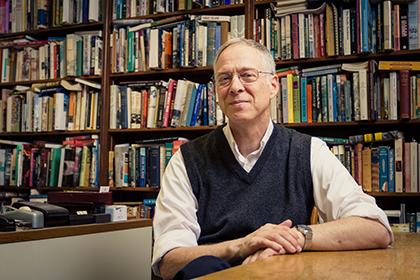Emeritus Professor John Findlay is a familiar member of the UW History community, having spent over thirty years teaching the histories of the North American West and the Pacific Northwest. Although he grew up in Seattle, his journey towards studying the history of his hometown is full of surprises. As an undergraduate at the University of Puget Sound, Findlay was initially interested in European history. His focus shifted to the American West as a graduate student at the University of California at Berkeley, where he studied utopian communities such as the Mormons. It was during that same time in which he took on a side job that ended up inspiring the research which would define his career.
As part of the environmental movement of the 1960s and 70s, federal and state governments increasingly required developers and land agencies to file “environmental impact statements” before being approved for large-scale projects. Findlay was hired to assess the historical value of potential development sites all over the American West, traveling to places such as Owens Valley in eastern California, a bombing range in central Nevada, and the site of a proposed dam in the Sacramento Valley. Filing environmental impact statements did not always result in the protection of historical sites, but it did at least provide historians with an opportunity to document these sites prior to destruction, and for museums to step in and conserve parts of the material landscape.
Findlay eventually traveled to San Jose, which was redeveloping its downtown during the 1970s-80s. The city hired Findlay and his colleagues to do a block-by-block assessment to identify potential historical resources. “This work was formative for me,” he recalls, “because it revealed how history was being destroyed and recovered. We were recovering traces of the past that had already been degraded and now seemed due for complete obliteration in a fairly short time frame.” What had started as a student side job in “emergency salvage archeology,” turned out to become the central research interest of Findlay’s career. He realized that these sites symbolized the struggles emblematic of the American West in the history of the United States. The job also put him in contact with people studying and preserving the Native American past and raised his awareness of the need to study the American West from multiple perspectives.
This ability to highlight multiple perspectives when writing about the American West became a defining feature of Findlay’s scholarship over a distinguished career, and it remains very much in evidence in his recent work. A lot has changed in the field of the American West since he cut his teeth as a graduate student doing salvage archaeology, and his new book, The Mobilized American West, 1940-2000, engages with recent academic challenges to the very category of “the West” while exploring the importance of regionalism in the 20th century. It was important to Findlay not only to study how social, cultural, and political trends that emerged in the western states influenced the United States as a whole, but also to provide multiple perspectives and experiences from the region's diverse inhabitants by integrating the voices of Native Americans, Mexican Americans, Asian Americans, African Americans, and others.
Despite retiring in 2020, Findlay continues to devote much of his energy to the Department of History and his field of study. He currently serves on the History Advisory Board and continues to supervise graduate students. More recently, Findlay has made the decision to return to the classroom. As part of the department’s long-running History Lecture Series (HLS), which this year focuses on Seattle and the Salish Sea, Findlay will teach the accompanying undergraduate course. But he’s not stopping there! Findlay will also be one of the featured HLS lecturers. He is delighted to be able to continue contributing to the department and the wider community through his involvement with HLS. You can hear Findlay’s talk, “City and Citizens: Seattleites and Their Rights, 1850-2000,” on Wednesday, January 10 at 7:00 p.m. in Roethke Auditorium, Kane Hall.
